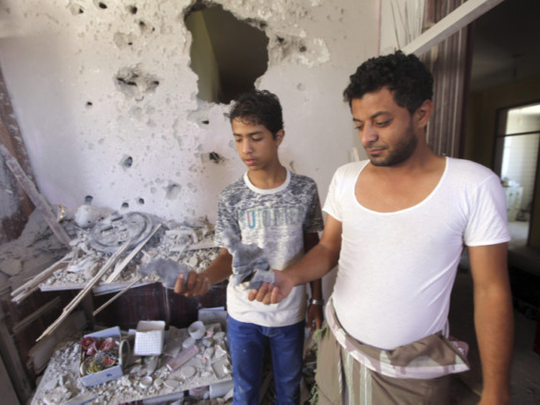
Dubai: The lightning takeover by Al Houthi rebels of Yemen’s capital this week is a potential boost for Iran against its rival Saudi Arabia, while the US is preoccupied with fighting Islamist militants, analysts said.
It is still unclear what the links are between Al Houthi rebels and Iran, but Tehran will no doubt be pleased by a move that offers the prospect of expanding its influence on the Arabian peninsula.
But while it is also unclear what the rebels plan to do now, any ambitions they may have to dominate the whole country are out of the question.
The capital Sana’a lies in the Shiite-majority northern highlands, but the rest of Yemen is overwhelmingly Sunni and Al Qaida militants have a strong presence in the south and east.
As it stands, rebel leader Abdul Malek Al Houthi has taken advantage of growing poverty, a rejection of the traditional tribal elites and the collapse of state institutions to impose himself as a force to be reckoned with in the capital.
Ebrahim Sharqieh, an analyst at Brookings, said there is “no hard evidence to confirm official Iranian backing though the issue is very clear that the Al Houthis receive significant support from Iran”.
Longtime president Ali Abdullah Saleh’s successor, Abd Rabbo Mansour Hadi, a Sunni originally from the south, is adamant there are “foreign plots” aimed at torpedoing progress in Yemen.
“Internal and foreign forces [have] allied to... overthrow the Yemeni model” of political transition after the uprising of 2011, the president said.
His claims were backed by reports that Yemen freed this week two Iranians said to be members of Iran’s elite Revolutionary Guards who were accused of having trained the Al Houthi rebels.
The rebels’ advance coincides with an intensification of the war on Daesh (the self-proclaimed Islamic State) in Iraq and Syria by the United States and its Gulf allies, leaving the battle against pro-Iranian groups low among priorities.
For the analyst Sharqieh, “the Americans have chosen to accommodate Iran’s expansion of influence in Yemen for two reasons”.
The first is “a lack of strategy on how to resist this increasing influence,” coupled with Washington “sticking to its traditional security-focused approach of prioritising counter-terrorism over any other aspect of its relations with the Middle East.”
Washington regards Al Qaida’s Yemen-based affiliate as its most dangerous and has been waging a drone war against its leaders for years, with the backing of first Saleh and more recently Hadi.
Sharqieh said the Al Houthis and Iran are “staunch adversaries” of Al Qaida in the Arabian Peninsula, “so the arrival of Al Houthis to power, though they raise a slogan of ‘death to America,’ is still [more] favourable to the US than an increasing influence of Al Qaida”.
And he added that US Secretary of State John Kerry’s statement about a role for Iran in the fight against terrorism “is an indicator of where [President Barack] Obama’s first priority is”.
Neil Partrick, a Gulf analyst at the Royal United Services Institute for Defence and Security Studies, said the Al Houthis “are more likely to be seen in Iran as one of several ways of pressuring Saudi Arabia and of suggesting regional leverage.”
So far, Riyadh has not reacted to the seizure of Sana’a by the rebels, who were involved in border skirmishes with Saudi Arabia in 2009 and 2010.
For now it remains to be seen whether the kingdom will accept the latest turn of events in Yemen or, instead, support the Al Houthis’ Sunni rivals, the Islamist Al Islah party, which is linked to the Muslim Brotherhood, an organisation opposed by Riyadh.












